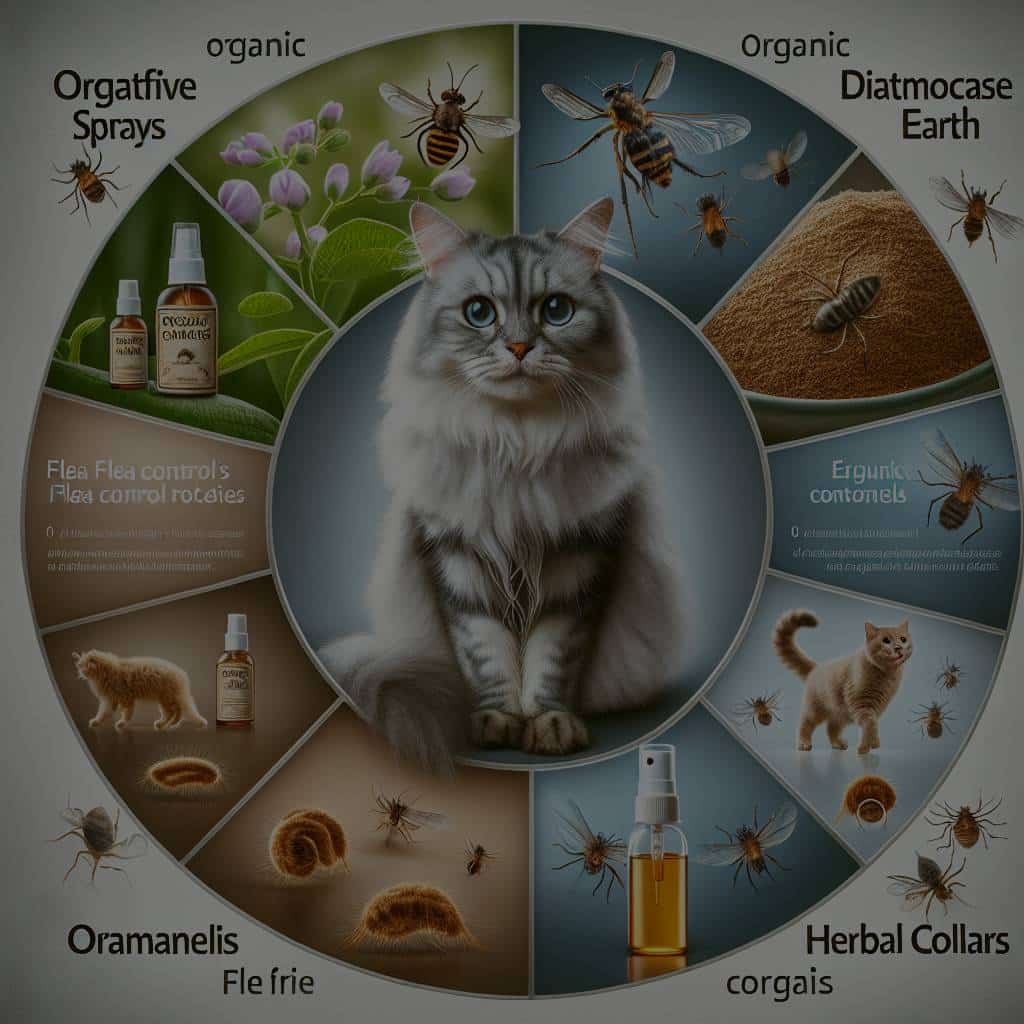What Are the Best Organic Flea Control Methods for Sensitive Cats?

Fleas are a common issue for pet owners. These pesky parasites grasp onto the skin of your beloved pets and feed off their blood, causing discomfort and health problems. If your cat is sensitive or allergic to chemicals, traditional flea control methods can become a nightmare. Organic or natural flea control products offer a viable solution, but choosing the most suitable one can be confusing. This article unravels the best organic flea control methods ideal for sensitive cats.
Understanding the Life Cycle of Fleas
Before delving into the best organic flea treatments, it’s important to understand the life cycle of fleas. This knowledge is key to effectively combat these parasites.
In the same genre : How to Prepare a Nutritious Diet for a Convalescing Bird?
A flea’s life cycle can be broken down into four stages: egg, larva, pupa, and adult. Female fleas lay eggs on the host animal’s skin, which can easily fall off into the environment. These eggs hatch into larvae, which feed on organic debris and eventually form a cocoon – the pupa stage. Inside the cocoon, the larva matures into an adult, ready to infest a new host. This cycle can take anywhere from a couple of weeks to several months, depending on the conditions.
Safe and Natural Flea Control Products
In the world of pet care, many companies have started offering natural flea control products. These products use ingredients derived from nature, such as essential oils and plant extracts, to ward off fleas.
Also to discover : Can Dogs Benefit from Listening to Classical Music and How?
One of the most popular natural flea control products is flea spray. Flea sprays are usually water-based and contain essential oils like cedarwood, lemongrass, or peppermint, known for their insect-repelling properties. When applied to your cat’s skin and coat, these sprays can help deter fleas.
Another popular organic product is flea collars infused with essential oils. These collars slowly release the oils onto your cat’s skin, providing lasting protection against fleas.
Essential Oils and Their Roles in Flea Control
Essential oils have been used for centuries due to their numerous health benefits. In recent years, they’ve become popular in pet care, particularly in flea control.
Certain essential oils, such as eucalyptus, peppermint, and lemongrass, are known to repel fleas. When used correctly, these oils can prove effective in flea control.
However, caution is advised when using essential oils. Some oils can be toxic to cats, so always consult a professional before applying any essential oil to your pet’s skin. Moreover, essential oils should always be diluted with a carrier oil before application.
DIY Flea Control Methods
For pet owners who prefer a hands-on approach, DIY flea control methods can be an excellent choice. These methods often involve common household items, making them cost-effective and easily accessible.
One popular DIY method is the flea comb. Regularly combing your cat with a fine-toothed comb can help remove adult fleas and prevent them from laying eggs. This method is labor-intensive but can be very effective when done correctly.
Another DIY method involves creating your own flea spray using water and a few drops of flea-repelling essential oils. This spray can be applied to your cat’s coat daily to deter fleas.
A homemade flea bath using mild dish soap and warm water can also be effective. The soap breaks down the flea’s exoskeleton, causing them to drown.
Tackling Fleas in the Environment
Flea control isn’t just about treating your pet – it’s also about treating the environment. Adult fleas make up only 5% of the total flea population in an infestation. The rest are in the egg, larval, or pupal stage, likely found in your pet’s environment.
Regularly washing your pet’s bedding and vacuuming your home can help eliminate these immature fleas. Diatomaceous earth, a natural powder made from tiny fossilized aquatic organisms, can also be used. It kills fleas by dehydrating them and is safe to use around pets.
Moreover, beneficial nematodes, microscopic roundworms, can be used in your yard to kill flea larvae and pupae. They are harmless to pets and humans but lethal to many garden pests, including fleas.
As pet owners, your goal is to keep your animals safe and comfortable. When dealing with fleas, the best approach is a combination of preventative and reactive measures. With the organic flea control methods above, you can protect your sensitive cats from these pesky parasites in a safe and natural way.
Herbal Flea Remedies and Supplements
Indeed, herbal flea remedies and supplements are another option if you’re looking for a more holistic approach to flea control. They’re typically made from a blend of natural ingredients that help in repelling fleas and ticks.
Garlic and brewer’s yeast are two common ingredients found in these supplements. Garlic, in small amounts, can deter fleas due to its strong smell. Brewer’s yeast, on the other hand, is rich in B-vitamins, which some believe may alter the taste of your cat’s blood, making it less appealing to fleas. However, it’s crucial to administer these, particularly garlic, with care as they can be toxic to cats in large amounts.
Herbs such as Rosemary, pennyroyal, and rue are also often included for their flea-repelling properties. They can be used to prepare a herbal bath or spray for your cat. Remember, using these herbs requires careful dosage and preparation, so consulting a holistic veterinarian can be useful.
Remember to pair these herbal remedies with other flea control methods for a more comprehensive approach. Regularly check the price of these supplements and compare them with other flea treatments to get the best value for your money.
The Best Flea Treatment: Prevention is Better Than Cure
The best flea treatment of all is preventing an infestation in the first place. A multi-pronged approach to flea control is necessary to ensure a flea-free environment for your cat. This includes regular grooming, use of flea control products, and maintaining a clean home and yard.
Regularly groom your cat using a flea comb to physically remove fleas. This won’t kill fleas instantly, but it can help reduce the number of adult fleas laying eggs on your cat.
Invest in natural flea control products such as flea sprays and flea collars infused with essential oils. These can deter fleas from infesting your cat in the first place.
Maintain a clean home by washing your pet’s bedding regularly and vacuuming carpets and upholstery to remove flea eggs. Use diatomaceous earth around the house, especially in areas where your cat spends a lot of time.
In your yard, consider using beneficial nematodes to help control the flea population.
Conclusion
Fleas can be a big problem for both pets and pet owners, especially if your cat is sensitive to chemicals. However, with a variety of organic flea control methods available, managing a flea infestation has become easier.
Whether it’s through the use of essential oils, DIY flea treatments, herbal flea remedies, or environmental control, there are numerous ways to combat these pesky parasites naturally and safely. The key, however, lies in early detection and prevention. Stay vigilant and take proactive steps to prevent a flea infestation from occurring in the first place.
Remember, while these methods can be helpful, it’s always best to consult with a veterinarian before starting any flea treatment regimen. They can provide personalized advice based on your cat’s specific needs and sensitivities. This way, you can ensure that your cat stays flea-free in the most effective, efficient, and safe manner possible.
